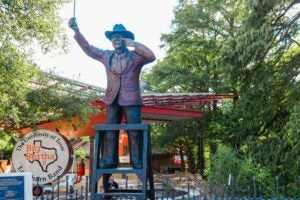AUSTIN, Texas—Latino USA, the radio journal of news and culture located on The University of Texas at Austin campus, soon will broadcast a series of special reports that examine the human dynamics and complexities of the aftermath of Hurricane Mitch, which about six months ago left more than 9,000 people dead in Central America.
The reports will air on approximately 175 public radio stations nationwide and also will be accessible through Latino USA’s web site http://www.latinousa.org Local NPR stations may be contacted for broadcast times. Latino USA is a production partnership of the Center for Mexican American Studies and KUT-FM radio at UT Austin.
The series will examine the hurricane’s effects on the political, economic, and social realities of Central America and their implications for the United States. The reports will begin the week of May 14 and continue periodically through October, the one¬year anniversary of what some call the worst natural disaster in the region’s history.
In the first report, The Street Children of Mitch, producer María Martin examines internal migration in Central America as it affects children. She reports how Mitch exacerbated the already growing problem of street children in Guatemala, while in Honduras, hundreds of homeless, orphaned children have gone north for a better life — only to find rejection, violence, and often, drugs and prostitution.
In another report, Farming Honduras after the Storm, reporter Ingrid Lobet visited farmers near the Chiquito River. She reports that the hurricane has ruined many livelihoods and also revealed the long-term vulnerability of the nation’s soil and water.
In subsequent reports, Hurricane Mitch and Broken Promises, will look at a town on Guatemalan’s Caribbean coast, where residents still wait for the help promised by politicians and the media. When the Fish are Gone, examines the lives of subsistence fishermen, who have defended their sustenance for years from industrial shrimp farms. Now, in Mitch’s wake, their lagoons are polluted and void of fish.
Other topics to be covered include the hurricane’s impact on immigration to the United States, the challenge of rebuilding the economy of Central America, and the impact of the disaster on the democratization process and tourism in the region.
The series is funded by the Corporation for Public Broadcasting and distributed by National Public Radio®. It was conceived as an effort to inform radio audiences about their neighbors in the hemisphere and the forces that are influencing migration north to the United States.
For more information, call executive director Kate Dearborn at (512) 475-6767, visit Latino USA’s web site (http://www.latinousa.org) or call your local NPR station.



